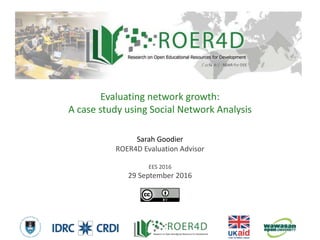Evaluating Twitter network growth: A case study using Social Network Analysis
- 1. Sarah Goodier ROER4D Evaluation Advisor EES 2016 29 September 2016 Evaluating network growth: A case study using Social Network Analysis 9/29/20161
- 2. Outline ŌĆó The project being evaluated: ROER4D ŌĆó Evaluation framework: what & how ŌĆó The Tools workflow ŌĆó Findings: Twitter network growth & online interactions ŌĆó Discussion & conclusion
- 4. in the Global South ŌĆó In what ways, and under what circumstances can the adoption of OER address the increasing demand for accessible, relevant, high-quality and affordable education and what is its impact in the Global South? Research on Open Educational Resources for Development http://roer4d.org/
- 5. ROER4D has 86 researchers across 18 sub-projects in 26 countries across 16 time zones
- 6. 1. Build an empirical knowledge base on the use and impact of OER in education 2. Develop the capacity of OER researchers 3. Build a network of OER scholars 4. Communicate research to inform education policy and practice 5. Curate output as open content ROER4D Objectives
- 8. 1. Build an empirical knowledge base on the use and impact of OER in education 2. Develop the capacity of OER researchers 3. Build a network of OER scholars 4. Communicate research to inform education policy and practice 5. Curate output as open content ROER4D Key Evaluation Areas EVALUATION Using the utilization focused evaluation (UFE) framework
- 9. What is utilization focused evaluation (UFE)? UFE is centered around intended use by intended users - What do the users (key stakeholders) want to know? - How will answers to the evaluation questions potentially help to improve the project?
- 10. UFE in 12 steps: Steps are iterative, not linear Utilization Focused Evaluation Framework (Adapted from Ramirez & Brodhead, 2013)
- 11. 1. Build an empirical knowledge base on the use and impact of OER in education 2. Develop the capacity of OER researchers 3. Build a network of OER scholars 4. Communicate research to inform education policy and practice 5. Curate output as open content ROER4D Key Evaluation Areas Social networking KEQ: To what extent has ROER4D built a network of OER scholars?
- 14. The Tools workflow Data collected monthly or when the PIU requires an update
- 15. FINDINGS
- 17. TAGS
- 18. NodeXL
- 20. Key points ’é¦ SNA focuses on relationships ŌĆō good for networking ’é¦ Tools workflow for ROER4D networking data ’é¦ Tracks network growth and interactions over time ’é¦ Evidence of success in the ROER4D project ’é¦ Informed project & fueled improvement ’é¦ Can be applied to other projects
- 21. This work is licensed under a Creative Commons Attribution 4.0 International License. Website: http://roer4d.org Contact author: Sarah Goodier sarah.goodier@uct.ac.za @SarahGoodier Excluding images, screenshots and logos and/or unless otherwise indicated on content Thank you!
- 22. Further reading: About ROER4D: ŌĆó Hodgkinson-Williams, C. (2013). Research on Open Educational Resources for Development in Post-secondary Education in the Global South (ROER4D) - Scoping Document. Available online: http://hdl.handle.net/11427/8430 [Last accessed 10 February 2015]. ŌĆó Hodgkinson-Williams, C. and Cartmill, T. (2014). Research on Open Educational Resources for Development in the Global South: 1st Technical Report 23 June 2013 to 27 August 2014. Available online: http://hdl.handle.net/11427/9695 [Last accessed 11 February 2015]. About evaluation: ŌĆó Patton, M. Q. (2008). Utilization-focused evaluation. California: Sage Publications Inc. ŌĆó Ramirez, R. and Brodhead, D. (2013). Utilization Focused Evaluation: A Primer for Evaluators. Penang: Southbound.






















![Further reading:
About ROER4D:
ŌĆó Hodgkinson-Williams, C. (2013). Research on Open
Educational Resources for Development in Post-secondary
Education in the Global South (ROER4D) - Scoping Document.
Available online: http://hdl.handle.net/11427/8430 [Last
accessed 10 February 2015].
ŌĆó Hodgkinson-Williams, C. and Cartmill, T. (2014). Research on
Open Educational Resources for Development in the Global
South: 1st Technical Report 23 June 2013 to 27 August 2014.
Available online: http://hdl.handle.net/11427/9695 [Last
accessed 11 February 2015].
About evaluation:
ŌĆó Patton, M. Q. (2008). Utilization-focused evaluation.
California: Sage Publications Inc.
ŌĆó Ramirez, R. and Brodhead, D. (2013). Utilization Focused
Evaluation: A Primer for Evaluators. Penang: Southbound.](https://image.slidesharecdn.com/eespresentation29sept2016a-160929100342/85/Evaluating-Twitter-network-growth-A-case-study-using-Social-Network-Analysis-22-320.jpg)